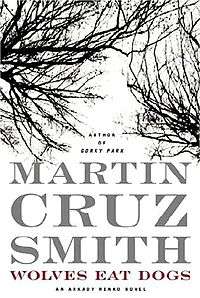Wolves Eat Dogs
|
First edition | |
| Author | Martin Cruz Smith |
|---|---|
| Country | United States |
| Language | English |
| Series | Arkady Renko # 5 |
| Genre | Crime novel |
| Published | 2004 |
| Publisher | Simon & Schuster, Macmillan |
| Media type | Print (Hardcover, Paperback) |
| Pages | 352pp (hardback edition) |
| ISBN | 0-684-87254-4 |
| OCLC | 55981782 |
| 813/.54 22 | |
| LC Class | PS3569.M5377 W65 2004 |
| Preceded by | Havana Bay |
| Followed by | Stalin's Ghost |
Wolves Eat Dogs is a crime novel by Martin Cruz Smith, set in Russia and Ukraine in the year 2004. It is the fifth novel to feature Investigator Arkady Renko and the first one taking place during the new independent era.[1][2]
Plot
Russia has changed from a Communist to capitalist state, and Ukraine has seceded from the former Soviet Union. When Pavel "Pasha" Ivanov, one of the leading members of Russia's new billionaire class, dies in an apparent suicide, Renko investigates. Pasha fell from the balcony of his penthouse apartment, and all the signs point to his having been alone at the time. The only anomaly is a large mound of table salt in the victim's wardrobe.
Despite interference from his own boss as well as from other persons of power, Renko continues his investigation by questioning Pasha's friends and associates. There is apparently some kind of dark secret in Ivanov's past, and Pasha was always very depressed around May Day. Just before he is forcefully removed from the investigation, Arkady returns alone to Pasha's apartment and reconstructs his movements on the night he died. In the drawer of his bureau, Arkady finds a radiation dosimeter wrapped in a blood-stained handkerchief. Turning it on, he finds that the entire apartment is radioactive, the highest levels coming from the mound of salt. Arkady concludes that Ivanov did indeed commit suicide but that it was under a form of duress.
Explanation of the title
There are a number of possible interpretations of the title:
- Wolves are said to attack domesticated canines out of the sentiment that the dogs have betrayed their own species by living with and depending on humans for their survival. The contemptible dogs have unforgivingly traded their priceless freedom for food, security and other creature comforts.
- The murderer, when revealed, describes himself as a wolf, not so much for any violence or viciousness in his character, but because he considers himself a true predator: attacking his victims, and disposing of his unreliable associates, without compunction. One of these associates, on his deathbed, mentions playing "the Wolf" in a school production of "Peter and the Wolf," and fancied himself as a wolf, "until I met a real one."
- The title can also be taken as a metaphor describing the corruption surrounding Arkady; the "wolves" being large organizations or powerful men that eat the "dogs" (meaningless men like Arkady Renko), who are insignificant in society and prove to be nothing more but an obstacle that must be eradicated. As wolves hunt in packs to overpower their prey, so do businesses and large organizations in this novel.
Allusions to real-life history, persons, or places
- Most of the novel takes place in the "dead zone" around the site of the Chernobyl disaster. To "amuse" a company at dinner one night, Alex tells his own dramatic story of exactly how the meltdown occurred.
- Oddly, the novel predates by several years the poisoning of Alexander Litvinenko, which bears certain similarities to the attacks on Pasha Ivanov.
- Though there are several radioactive isotopes found at the site of the Chernobyl disaster, Caesium-137 is the most common (which may be why the killer chooses it to attack Ivanov and Timofeyev).
 View from building with Pripyat amusement park Ferris wheel visible
View from building with Pripyat amusement park Ferris wheel visible- Entrance to the Chernobyl Exclusion Zone at Checkpoint "Dityatki"
References
- ↑ Wroe, Nicholas, The Guardian (March 26, 2005). Crime Pays
- ↑ Petit, Chris, The Guardian (April 2, 2005). Dead zone
